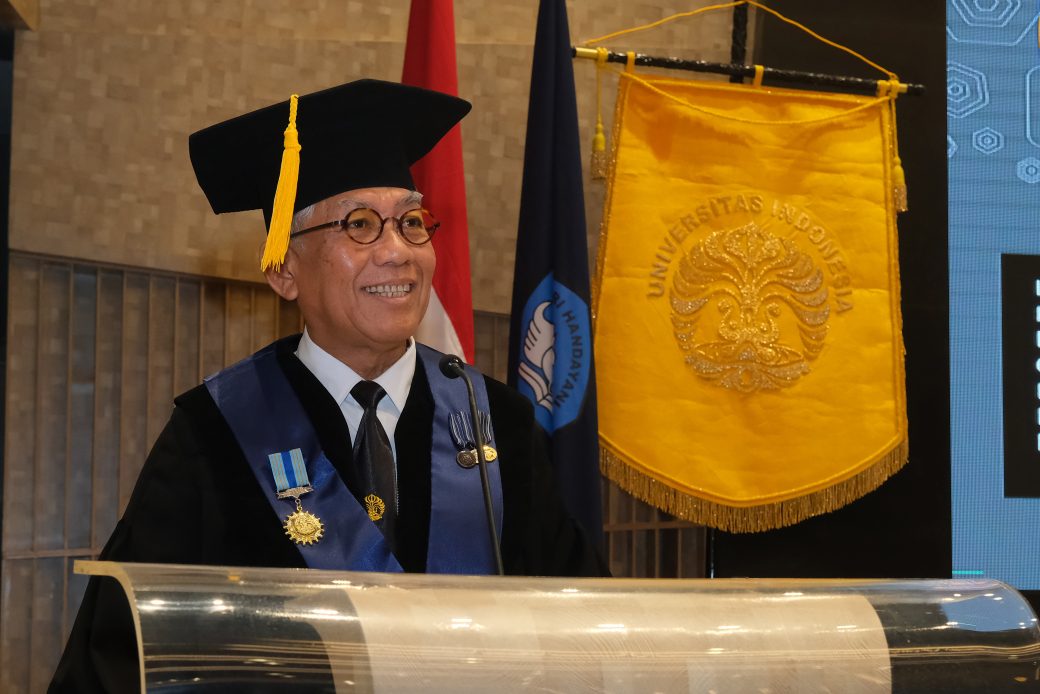Prof. Dr. Ir. Andy Noorsaman Sommeng, DEA, IPU was named Permanent Professor of the Faculty of Engineering (FT) of Universitas Indonesia (UI) in his professorship session, on Wednesday (26/7), at Makara Art Center UI, Depok Campus. The inaugural session led by UI Rector, Prof. Ari Kuncoro, S.E., M.A., Ph.D., was also attended by the Chairman of the Supreme Audit Agency (BPK) of the Republic of Indonesia (RI), Dr. Isma Yatun, CSFA, CFrA, CFrA; Minister of Energy and Mineral Resources of Indonesia (ESDM) for the period 2016-2019, Dr. (H.C.) Ignasius Jonan, S.E., M.A.; and President Commissioner of PT Perusahaan Gas Negara (PGN), Ir. Arcandra Tahar, M.Sc., Ph.D..
In the study titled “Thinking the Unthinkable: Black Swan Events, Risk and Systemic Failure of Complex Energy Engineering Systems”, Prof. Andy reviewed three concepts present in technological accidents to highlight the importance of scientific research and knowledge management in reducing hazards and anticipating technological risks in high-risk industries. The three concepts are black swan events, systemic risk and systemic failure.
Technological accidents in high-risk industries are a threat to the population, environment and economy. Sometimes the notion of black swan events is applied as an explanation for accidents that cannot be prevented, as well as technological accidents triggered by natural hazards. Technological accidents are predictable and preventable when the associated risks are managed responsibly and when warning signs are not ignored.
Systemic risk is the risk associated with a failure or breakdown in a system that can cause a widespread impact on the entire system or market. This can occur due to the interconnectedness of various assets or institutions within the system. Systemic risk is usually more dangerous than risks that affect only a single institution or asset, as it can lead to a financial crisis or even an economic recession. An example of systemic risk is the global financial crisis in 2008.
Systemic failure, is a failure in the system that causes the system to be unable to function or stop operating altogether. This failure is due to several factors, namely errors in system design, failures in the production process, or unexpected changes in the environment. Examples of these cases are the failure of a city-wide lighting system due to a large power outage or the failure of a ship’s fuel delivery system that causes the ship to be stranded.
Meanwhile, black swan events are unexpected, extremely rare, and have a huge impact on the system or environment. These events are difficult to predict and cannot be accounted for in traditional risk models, making it difficult to anticipate and minimize. These three concepts are interrelated, as black swan events not only trigger systemic failures in complex energy systems and industries but also in the financial sector or economy.
Many experts have argued that complex energy system risk is a pathway to a systemic risk landscape, due to the multi-hazard nature of risk. For example, the earthquake in Japan not only triggered the Fukushima nuclear power plant accident and made the land unusable for living and agriculture; it also damaged a large number of industrial facilities, caused chemical releases, fires and explosions, and affected the global supply chain due to loss of production capacity. Therefore, risk engineers must help mitigate potential systemic risks by containing accidents before their effects spread to the system in unexpected ways.
“Chemical engineering academics and practitioners play an important role in creating and disseminating knowledge about abnormal event management in complex engineering systems, and its public and corporate policy implications. It is vital for chemical engineering academics to rise to the challenge and responsibility of encouraging the education of the next generation of chemical engineers with a higher sensitivity to the importance of safety, sustainability, and ethics,” Prof. Andy said in his inaugural speech.
Besides researching the concept of technological accidents, Prof. Andy also conducted several other studies, including Techno-Economic and Risk Assessments of Small-Scale LNG Distribution for Replacing Diesel Power Plants in the East Part of Indonesia (2023); Small Scale LNG Distribution Network for Energy Transition in Indonesia (2023); and Machine Learning Algorithms for Failure Prediction Model and Operational Reliability of Onshore Gas Transmission Pipelines (2023). Prof. Dr. Ir. Andy Noorsaman Sommeng, DEA, IPU completed his Gas Engineering degree at the Universitas Indonesia (1984); Master of Chemical and Computer Engineering at the University of Compiegne (1989); and Doctor of Chemical and Computer Engineering at Ecole Centrale, Paris (1993).
***
Bureau of Public Communication
Faculty of Engineering, Universitas Indonesia

